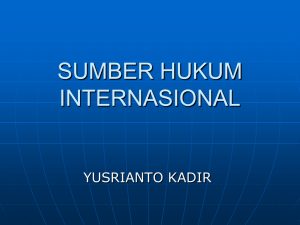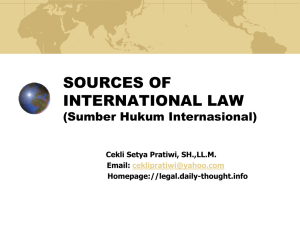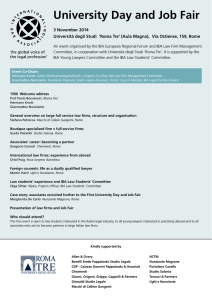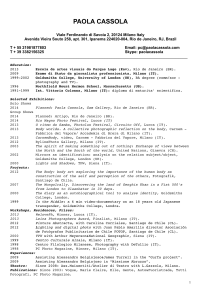Istilah, Definisi dan Karakteristik Hukum Internasional
advertisement
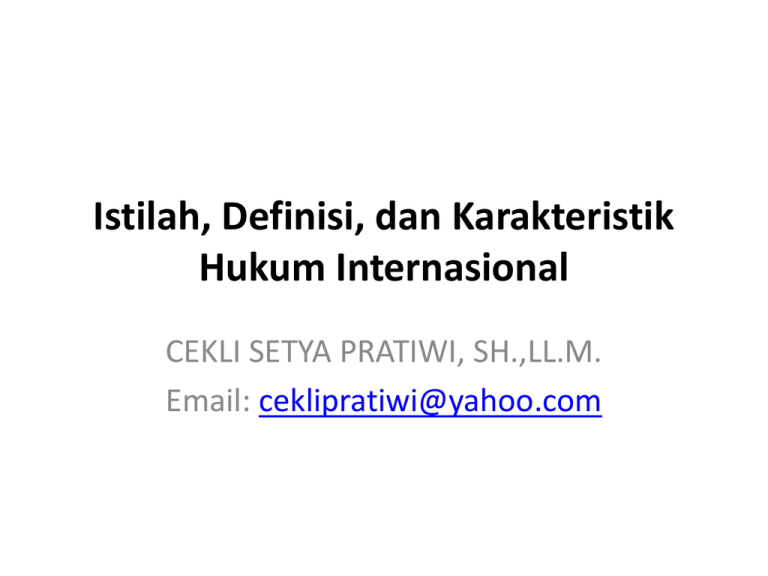
Istilah, Definisi, dan Karakteristik Hukum Internasional CEKLI SETYA PRATIWI, SH.,LL.M. Email: ceklipratiwi@yahoo.com a. Asal Mula Istilah Hukum Internasional • droit de gens, ius gentium, Volkerrecht, Volkenrecht (1780-1840)/ Hukum BangsaBangsa • Law of state/ Hukum Antar Negara • Public International Law (PD II)/ Hukum Internasional Publik • International Law/ Hukum Internasional (HI Modern/ Setelah PD II) b.Istilah Hukum Internasional • Romawi : Ius Gentium, Ius Inter Gentes • Indonesia : Hk. Bangsa-bangsa, Hk. Antar Bangsa, Hk. Antar Negara, Hukum Internasional • English : International Law, common Law, Law of mankind, Law of Nation, Transnational Law (Inggris). • France : Droit de gens • Ducth : Voelkenrecht. • Germany : Woelkrrecht. 5. Definisi Hukum Internasional Menurut Para Pakar • • • • Pandangan klasik : “system Hk. yang mengatur hubungan negara-negara.” b. Prof. Hyde : “sekumpulan hukum, yang sebagaian besar terdiri dari asas-asas dan peraturanperaturan tingkah laku yang mengikat negara-negara, karena itu biasanya ditaati dalam hubungan negara-negara satu sama lain.” c. J.L. Brierly[ : “ himpunan kaidah-kaidah dan asas-asas tindakan yang mengikat bagi negaranegara beradab dalam hubungan mereka satu sama liannya.” d. Oppenheim : “International law is the name of the body of customary and treaty rules which are of considered legally binding by states in their intercourse which each other”. • • • • e. Max Rosense :”International law is a strict term of art, connoting that system of law whose primary function it is to regulate the relation of stateswhic one another “. G. Schwarzenberger :“ International law is the body of legal rules binding upon sovereign state and such other en tities as have been granted International personality”. f. Prof. Dr. Mochtar Kusumaatmadja, SH.,L.L.M. : “keseluruhan kaidahkaidah dan asas-asas yang mengatur hubungan atau persoalan yang melintasi batas- batas negara antara: – NEGARA dengan NEGARA; – NEGARA dengan SUBYEK HUKUM LAIN BUKAN NEGARA; – SUBYEK HUKUM BUKAN NEGARA satu dengan YANG LAIN. Discussion Can you make a definition of International Law on your own words? Diskusi: 1. Apakah Persamaan dan perbedaan istilah Hukum Internasional dengan istilah Hukum Bangsa-Bangsa dan Hukum Antar Negara? 2. Mengapa istilah Hukum Internasional dianggap istilah yang paling tepat dibanding istilah Hukum Bangsa-bangsa atau Hukum Antara Negara? 1. Istilah Hukum Internasional mencakup seluruh subyek hukum yang diatur di dalam Hukum Internasional yaitu: a. Negara b. Organisasi Internasional c. Individu/ subyek Hukum Internasional lainnya • Sedangkan istilah Hukum antar bangsa hanya mencakup subyek hukum internasional dalam arti sempit yaitu hanya mengatur hubungan antara bangsa yang satu dengan bangsa yang lain. Begitu pula istilah Hukum antar negara hanya mengatur hubungan antara negara dengan negara, sehingga di dalam kedua istilah ini subyek Hukum Internasional yang muncul dewasa ini spt organisasi internasional, individu, dll belum tercakup di dalamnya. 2. Istilah Hukum Internasional dianggap paling tepat karena: a. Istilah HI paling mendekati kenyataan dengan sifat dan masalah-masalah yang menjadi obyek dari HI dan telah mencakup seluruh subyek HI yaitu negara, OI, individu, dll. b. Penggunaan istilah HI tidak menimbulkan keberatan diantara pakar HI karena istilah “internasional” telah lazim digunakan orang untuk segala peristiwa yang melintasi batabatas wilayah suatu negara. Dengan menggunakan istilah HI sekaligus menunjukan sejarah dan perkembangan Hukum Internasional. Apa perbedaan antara Hukum Internasional dan Hukum Perdata Internasional? SIFAT DAN HAKEKAT HUKUM INTERNASIONAL Setujukan Anda bahwa Hukum Internasional tidak memiliki sifat hukum namun hanya sekedar Moral Internasional saja? (1790-1859) • Hobbes, Spinoza, Austin. Menurut John Austin, hukum internasional itu bukanlah hukum melainkan sekadar aturan-aturan moral positif (rules of positive morality). “Every law or rule (Taken with largest signification with can be given to term properly) is command....” - the laws of honour - the laws set by fashion - Rules of positives morality 2. Int Law Characteristic • The rule of molarilty – – – – Do not have legislative body Do not have judicative body Do not have executive body Sanctions do not exist • International Law – Law is not always made by legislative body (i.e. Internasional), – General Assembly of United Nations mostly act as legislative body – There are Int Court of Justice, Int Criminal Court, Int Arbitrate that act as judicative body – There is a Security Council that act as Int Police – Embargo does exist • Setujukah Anda bahwa hukum Internasional tidak memiliki sifat hukum sehingga lebih tepat disebut Moral Internasional? Do you agree with John Austin opinion regarding to International Law mentioned above? • Daya Berlakunya • Subyek Hukumnya • Urusan yang diatur Perbedaan Antara Hk. Antar Bangsa, Hukum Antar Negara dan Hukum Internasional perdaaan Hukum Antar Bangsa Hukum Antar Negara Hukum Internasional Masa Berlaku Abad 17 \sd 18 PD II Setelah PD II atau Abad 20 Subyek Hukumnya Bangsa/ Nations Hanya “Negara” 1. Negara 2. Organisasi Internasional 3. Individu B. Definition of International Law • American Law Institute : “Consist of rules and principles of general applicatioan dealing with the conduct of states and of international organizations and with their realtions inter se, as well as some of their relations with persons, whether natural or juridical.” • Sir Robert Jennings: “Although increasing global interdependence and the emergence of new player of international level have put into question the rule of the state in international affairs, international law still predominantly made and implemented by state” General and Regional International Law 1. General International Law – – – – A large number of states Binding upon all states Refers to universal international law Example: UDHR 2. Regional International Law – – – – – Applies only to certain group of states Binidng upon certain group af states Refers to Imtermational comity community of the states Continental shelf Characteristics of International Law • Domestic Law is addressed to a large number of gorvernmental bodies and private individuals and group of individual. International Law is primarly concern with the lagl regulation of the international intercoursw of states wich are organized as territorial entites limited in number and consider themselve. • Horizontal legal system • Lacking a supreme authority • Centralization of the use of force • Considered to be a collective responsibility of the whole

